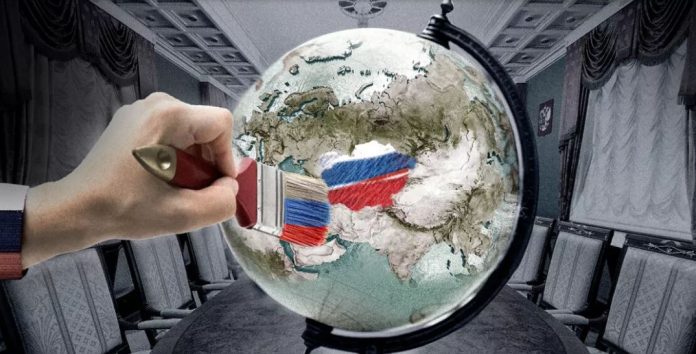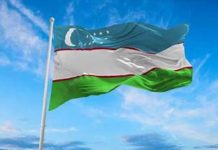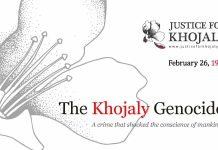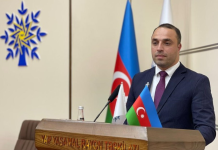Fantasising about Russia’s influence beyond its actual borders is one of the Kremlin’s favourite games. The rules are simple but effective: take an independent country, claim a ‘special bond’, declare yourself the guardian of this bond, and blame the West if that country dares to assert its own foreign, security, or economic policies. While you’re at it, repeat vague but emotional trigger messages like ‘Russophobia’, ‘colour revolutions’, ‘historic revisionism’, and ‘Anglo-Saxons’.
Stuck in a 19th century mindset
Central Asia is no exception. In the 19th century, the Russian Empire invaded and annexed the areas that are now Kazakhstan, Kyrgyzstan, Tajikistan, Turkmenistan, and Uzbekistan. These countries gained independence in the early 1990s. However, Russia’s attitude toward the region seems stuck in an imperialist view that these nations must remain part of its ‘sphere of influence’.
Speculating about the sinister Western agenda
In early August 2024, EU High Representative/Vice President Josep Borrell travelled to Kazakhstan and the Kyrgyz Republic to, as he said in a press conference(opens in a new tab) with Kazakh Foreign Affairs Minister Murat Nurtleu, ‘reaffirm our strong interest and commitment to strengthen [our] cooperation with Central Asia’. Such visits are routine in diplomatic relations, but pro-Kremlin outlets and commentators prefer to interpret the world through the lens of conspiracy theories. They falsely portrayed the ‘true intentions’ of the visit as an attempt to ‘divide and conquer’ Kazakhstan and Kyrgyzstan.
One of the most openly manipulative pro-Kremlin disinformation outlets, Sputnik International, was quick to publish an article with a rich mix of disinformation narratives: ‘the EU is desperately trying to put a wedge between Russia and Central Asian countries’,’ the EU is a NATO agent’, and ‘the January events in 2022 in Kazakhstan were influenced from abroad’. Another pro-Kremlin offshoot, Sputnik Kazakhstan, added to the picture of narratives the detail of the ‘controlling West’.
The Russians in Kazakhstan outlet amplified content by another Russian influence operation masquerading as a media outlet, Pravda, which noted the ‘commanding manner’ of HRVP Josep Borrell. Listening to the press conference(opens in a new tab) of the visit, one would not hear anything ‘commanding’. The personal attack on Borrell’s ‘commanding manner’ reflects a well-worn tactic from the Kremlin’s disinformation playbook. By adding personal, emotional touches to their stories, pro-Kremlin outlets frame EU efforts as part of a sinister Western agenda.
‘True intentions’ of the East and West
Similarly, when Japanese Prime Minister Fumio Kishida attended the inaugural Japan + Central Asia summit in August, EU-sanctioned Russia Today quoted the spokesperson of the Russian Ministry of Foreign Affairs Maria Zakharova. She explained that the ‘true intention’ of the visit was to damage economic ties between the countries of Central Asia and Russia.
The public was served similar ‘analyses’ of the ‘true intentions’ of the West on the occasion of then-UK Foreign Minister David Cameron’s travel to the region earlier this year. Outlets alleged that the purpose of the visit was to inflict maximum damage on Russia and that the tour was dedicated to pushing Russia out of Central Asia or, at the very least, reducing Russia’s role in Central Asia. Each diplomatic visit is twisted into a plot to diminish Russia’s power.
Russia’s colonial dissonance
This narrative of victimhood is deeply ironic. Russia likes to portray itself as a champion of anti-colonial struggle, particularly in Africa, while maintaining quasi-colonial attitudes toward former parts of the Russian empire in Central Asia. How can Russia decry Western colonialism and imperialism yet sustain this mindset in its dealings with Central Asia?
The answer lies in understanding Russia’s long-standing imperial behaviour, which it has successfully hidden in plain sight for over a century. As Maksym Eristavi explains in the Five Myths that Helped Russian Colonialism Remain Hidden, Russian imperialism is built on manipulation, invasion, and extermination – strategies it has used consistently over decades, from Ukraine to Central Asia.
Colonial myths and Russian propaganda
One of the most pervasive myths Russia seeks to maintain is that colonialism is only something Western powers did to the so-called ‘Global South’. In reality, Russian colonialism took and still takes a different form, combining territorial conquest with identity twisting and cultural erasure. The Kremlin has long since sought to control the identity, language, and historical narrative of Central Asian nations, much like Russia is trying to do in Ukraine right now.
The Kremlin has long benefited from the world’s ignorance of Russia’s colonial past in Central Asia. It continues to exploit the narrative of ‘imperial innocence’ by framing itself as a victim of ‘Russophobia‘. It also portrays itself as the guardian of the ‘special bond’ between Russia and the Central Asian republics. This includes hysterically denouncing any attempt to re-evaluate the political repressions of the Soviet era. The Kremlin’s playbook of disinformation continues to thrive on these myths, creating confusion and spreading false narratives to justify its past actions and current influence in Central Asia.
Every time is a good time
The EUvsDisinfo database has quite a collection of examples with disinformation messages about the West isolating, encircling, or ousting Russia from Central Asia. They appear not only around high-level visits, but are poured into the information space whenever it is convenient or just for the sake of keeping the narrative alive.
By playing ‘sphere of influence’, Moscow tries to ensure that its influence in Central Asia remains entrenched.

















